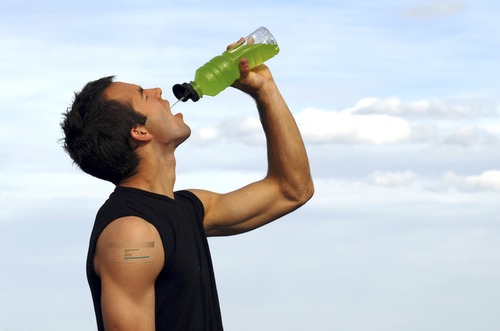| Article by Tim Leeming. Exercise Nutritionist. BAppSci (Hons) Hydration in exercise; we’ve been doing it all wrong! Have you ever heard the phrase “if you’re thirsty, it’s too late”? Sure you have, it has been the bottom line of advice for race hydration since the 80s! Sports nutritionists have been preaching to athletes of all ages and abilities that they should stay ahead of thirst. Wretchedly, this advice is not only erroneous, but can be dangerous in some situations. Why and how have we had it so wrong? |
Decades on and the damage has been done. What we are actually seeing now is that individuals setting foot in endurance events, such as half-marathons, are drinking too much! This phenomenon of over-hydrating has lead us to an arguably more life-threatening condition, exercise associated hyponatremia (EAH). EAH is basically a state of being drunk on water. It occurs when too much fluid is consumed and the electrolytes in our blood become diluted to harmfully low concentrations. This truly can be a dangerous state of affairs, with the worst-case scenario resulting in brain swelling, followed quite abruptly by death.
The reason I say that EAH is more hazardous to athletes than dehydration is because it is now significantly more common at endurance events around the world than the latter. In his recent book, here’s what world-renowned Professor of Exercise Science and Sports Medicine, Timothy Noakes, has to say about it:
"Between 1981 and 1984, as more and more cases of exercise associated hyponatremia surfaced, I was witnessing firsthand the factual evidence proving that it is possible for athletes to drink too much during exercise, to the point that this practice could ultimately be fatal. All of my studies after 1981 led me to the conclusion that athletes should drink according to thirst. ... There is also no evidence to suggest that fluid ingestion at such high rates (250ml per 15 minutes) – that is, drinking ‘ahead’ of thirst – does anything other than impair performance. Instead, all the evidence now shows that it is never necessary to replace all the fluid or weight that is lost during exercise. The only proven effect of drinking more is the development of exercise associated hyponatremia due to water intoxication."
- Challenging Beliefs: Memoirs of a Career (published 2012)
That’s right – we should actually be using our thirst as the indicator. The body is a very intelligent system, so we should trust what it tells us. Drinking to thirst is not only safe, but evidence suggests it also boosts performance. The faster finishing runners in the field are those who have lost more weight during the race. This weight loss is primarily a result of sweating to keep cool, and is completely safe if thirst during the race is answered by drinking and the lost weight is replaced in the hours succeeding the race.
Of course there is much more to be said about hydration before, during and after an event. If you have any questions about your race hydration or nutrition, register for our upcoming Eat To Run Webinar.
Click here to make sure you don't miss these handy training tips, and that they come direct to your inbox.





